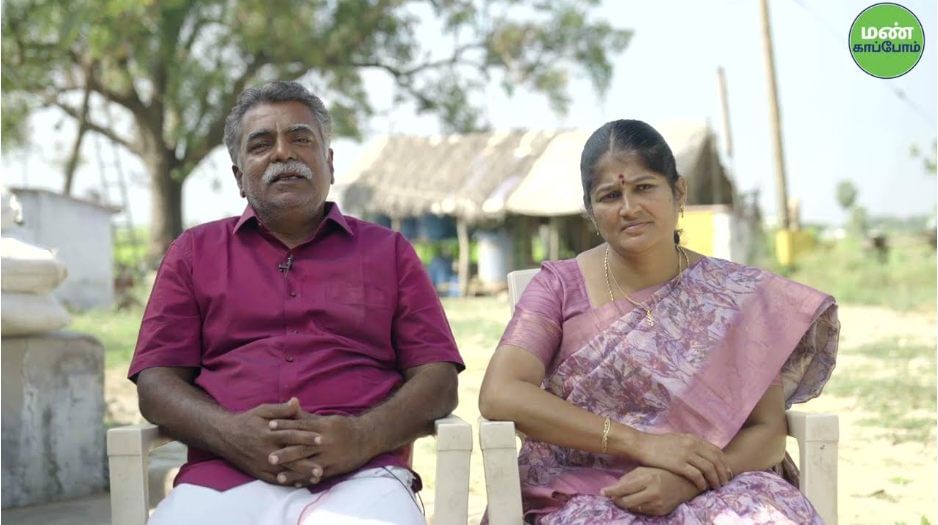>
Save Soil Regenerative Revolution>
Blogs>
Human Impact Stories>
Bharathi and Kavitha’s Natural Farming Journey: A Return to Health and Soil
Share
Bharathi and Kavitha’s Natural Farming Journey: A Return to Health and Soil
Human Impact Stories
14 Aug 2025
11:59 am
Driven by health concerns, this couple shifted to natural farming, growing native rice and millets with proven health benefits and strong market demand.

Bharathi and Kavitha from Palaippāykudi village in Palani began their farming journey like many others, relying heavily on chemical fertilizers and pesticides. In the early days, they cultivated brinjal, spraying pesticides every week to manage pests. Over time, they began to feel the consequences. The side effects of chemical exposure were unmistakable - eye irritation, throat pain, difficulty speaking. The health toll they experienced made them question their methods.
They realized that the health of the soil and their own well-being were deeply connected. This understanding set them on a new path. Their search for a better way led them to the teachings of Nammalwar, who introduced them to natural farming as a holistic and life-sustaining approach.
With determination, they joined multiple training programs through Isha’s Save Soil Initiative. There they learned about native seeds, the use of cow-based fertilizers like Jeevamrutham and Panchagavya, herbal pest repellents, and techniques to enhance soil fertility. They replaced their exotic HF cows with native cattle, which required less care and provided everything needed for natural fertilizer production.
They also understood how chemical fertilizers affect the soil. When urea and potassium are applied, much of the nitrogen remains in the air and is not properly absorbed by the plants. In natural farming, they learned how to address this imbalance. They began planting Gliricidia and Moringa trees, along with nitrogen-fixing legumes like red gram, in carefully spaced rows to restore soil health naturally.
Unlike high-yield hybrid seeds that must be purchased repeatedly, they found that native varieties can be saved and reused year after year. They learned to broadcast only eight kilograms of seed per acre instead of the usual thirty, and to apply correct spacing between plants between the eighteenth and twenty-second day after sowing. This significantly reduced seed cost and improved plant health.
Initially, their yield was low - about five hundred kilograms per acre. But with time, soil improvement, and rotational cropping with pulses and paddy, their harvests increased. They milled all their paddy into rice and sold it directly, based on the belief that food is medicine. Their rice requires only a small quantity to feel satisfied. When chewed well, it stimulates saliva, aiding digestion and supporting overall health.
They promote native rice varieties like Poonkāru, which supports women’s health, fertility, and pregnancy, and Thi-yamalli, which when used in idli, delivers both taste and health benefits. Luppai Poo-sampann rice helps with nerve weakness and has shown positive effects in children with autism, including their own. It also supports joint pain. Each rice variety they grow has its own health value.
To complement their rice, they also offer traditional millet flakes such as kambu aval, ragi aval, samai aval, black kavuni aval, Poonkāru aval, and Thi-yamalli aval. These flakes are nutritious and easy to cook, offering a balanced meal option. Many people buy just the flakes, while others combine them with rice for variety. They also retain the husk while cooking pulses to preserve nutrients that are usually discarded.
Even dishes like varagu rice biryani have become popular among their customers. One person who suffered from joint pain found relief by eating this rice twice a day, with a doctor recommending its continued use. This kind of feedback gave them immense inner satisfaction and even brought tears to their eyes. Through Eesa Agriculture, they were given opportunities to set up stalls and reach more people.
Bharathi and Kavitha now stand as living proof that natural farming not only restores soil health but revives human health and happiness. They continue to inspire other farmers through Isha’s Save Soil Initiative, sharing their journey and encouraging a return to farming that is safe, sustainable, and nourishing for all.
Keep In Touch
Get the latest updates on blog and happenings at Save Soil Regenerative Revolution and on the rest of Isha's social work — delivered to your inbox.
